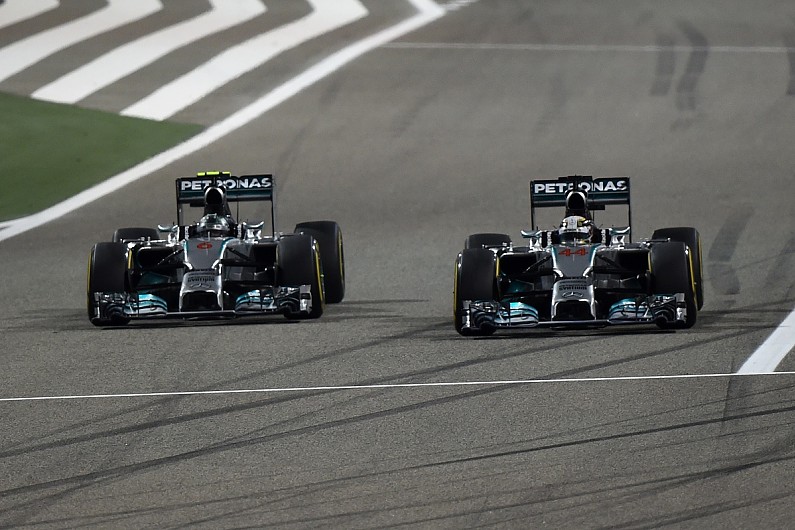Formula 1’s brave new turbo hybrid era finally delivered in brilliant fashion at the 2014 Bahrain Grand Prix – which was the subject of F1’s rewind broadcast today.
Here, with the help of the Autosport.com Archive, we take a look back at the stories of the race, and the bigger pictures that were bubbling away in the paddock at the time.
Sakhir spectacle
As the result of a move to make grand prix racing more road relevant, F1 had abandoned the screaming V8 engines in favour of hybrids for 2014 – with Mercedes’ domination of the first two races of the campaign proving to be a turn off for many.
The lack of noise and reduction of speed had been a big talking point in the opening weeks of the season, as Ferrari in particular pushed for radical change.
But that did not stop Sakhir delivering a fantastic spectacle, and it was Lewis Hamilton who triumphed after a thrilling battle with Mercedes teammate Nico Rosberg that went all the way to the chequered flag.
Let them race
The Bahrain GP proved to be the proper start of what would be an intense rivalry between Hamilton and Rosberg, as Mercedes management were eager to treat them equally.
Although it would have been all-too easy for the pitwall to order their charges to hold position to guarantee a second 1-2 finish of the season, the team’s executive director Paddy Lowe was adamant after the race that letting the pair fight was vital for the good of the spectacle.
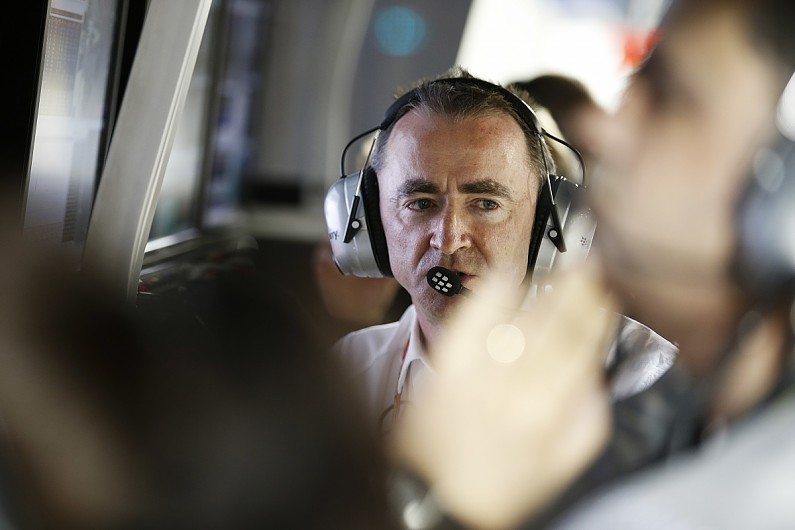
“Imagine if we had imposed team orders from lap two or something – what a terrible thing that would be for F1 and for the philosophy of Mercedes in motorsport,” he said.
“It is something that we owe to ourselves; we owe to the sport and owe to the drivers.
“They are professionals and you want to give them the opportunity to race, which is what they do.”
Ferrari resigned
Mercedes’ brilliant start to the turbo hybrid campaign had left its rivals downbeat about their chances of doing anything to stop the silver cars bossing the campaign.
After finishing a lowly tenth, Ferrari returnee Kimi Raikkonen reported that in power and traction terms, the Mercedes-powered machines of Williams, Force India and McLaren (below) were in another league compared to his F14 T.
“The Mercedes cars seemed to be able to pass us very easily on the straightlines,” the 2008 world champion said.
“One Force India got me on the exit of corner eight and it was like a different class.
“I was surprised. He came out of the pitlane but I had only done a few laps on the tyres. I went OK out of the corner and he just came inside of me and went past; I had no answer.
“And the next corner he had massive traction also, so it’s not just the horsepower.”
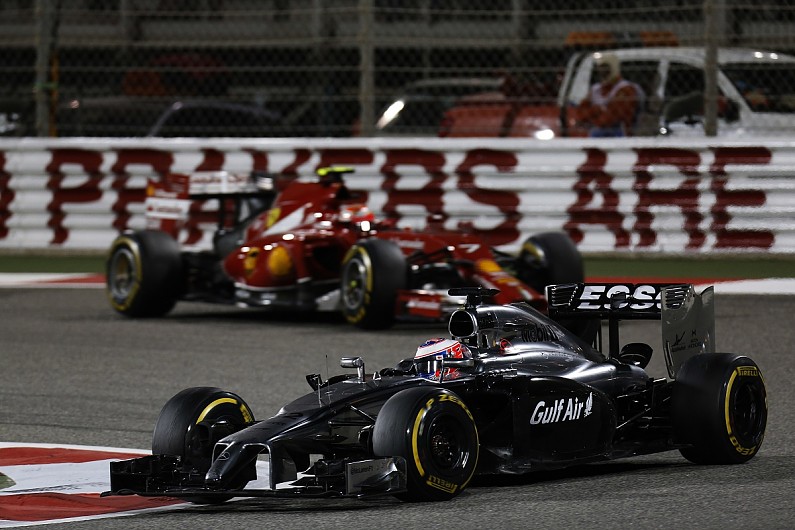
Teammate Fernando Alonso added: “Mercedes has been fantastic. They are doing a better job than anyone else and Nico and Lewis are driving fantastic, doing zero mistakes.
“We have had some difficult conditions with rain in qualifying, but they are doing zero mistakes, fighting but clean.
“At the moment it’s not possible to catch them in this first part of the championship, but we saw Brawn GP dominate in the first part of the championship [in 2009] and they struggled a bit at the end of the year.”
Of course things did not turn out how Alonso may have liked…
Maldonado in trouble
The Bahrain GP had been interrupted by a late-race safety car, which had been triggered by a memorable incident between Pastor Maldonado and Esteban Gutierrez at the first corner hairpin.
Lotus driver Maldonado had exited the pits after a tyre change and, expecting the Lotus driver to yield, Gutierrez had turned in, but found his Sauber being pitched into a spectacular roll.
Race stewards were unimpressed by what they had seen and handed Maldonado a grid penalty for causing an avoidable collision – as well as three penalty points on his licence.
Perez’s first podium for Force India
While Mercedes was in a class of its own at the front, Sergio Perez made the most of the benchmark powerunit to grab an emotional podium for the then Force India team.
Having endured the pain of being dropped by McLaren after a difficult 2013 campaign, the Mexican could not believe how well things had gone so early in the season for the team that has been his home ever since.
“It means a lot. It is a very special podium for me,” he said.
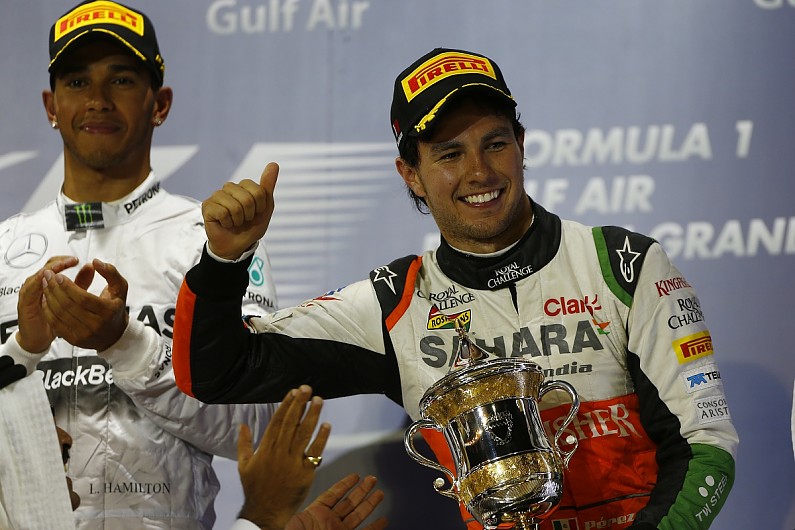
“I had a really tough time, my time at McLaren where I basically was far away and didn’t have a chance to fight for the podium.
“When I joined McLaren it was a very fast team, the fastest team there, so when the McLaren option came to me I didn’t think twice. I was hoping to fight for the title and win races. But it was really tough, more than people realise.
“It was not easy for me to fight for a podium, so to do it here in this race is a great feeling.”
Ecclestone urges change
Although Bahrain had been an exciting race, then-F1 supremo Bernie Ecclestone was far from impressed with the state of the sport – and there had been meetings in the paddock that weekend to discuss the situation.
Ecclestone had never been in favour of the move away from normally aspirated engines, and did not hold back ahead of the GP in offering his views on the problems F1 was facing.
“What is wrong is these fantastic engines,” he said.
“The engines are without doubt incredible, the amount of power they produce for the small amount of fuel.
“But I don’t think it is F1 business. They should do it in touring cars or something – not in F1.”
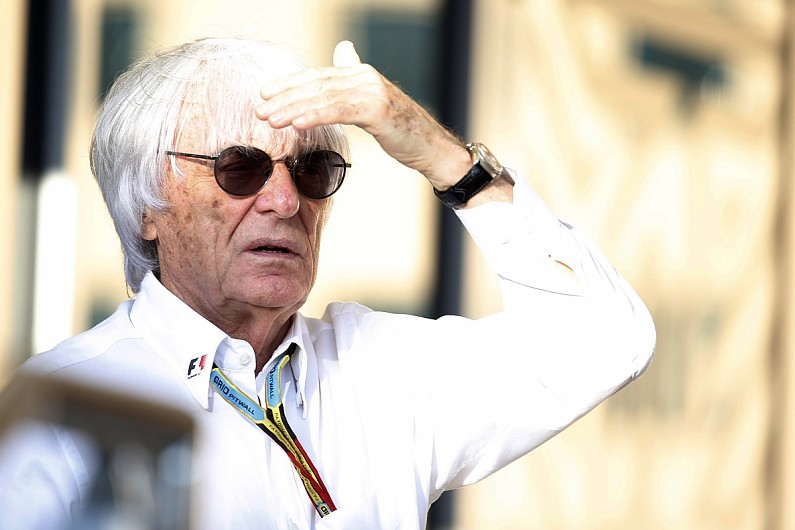
Sorting the noise
As well as the spectacle becoming a big talking point – which would eventually result in an aero rules revamp for 2017 – the issue of a lack of noise kept cropping up.
F1 had elected to set up a special committee to look in to what could be done to try to bring back some of the decibels that were now missing.
Mercedes would later try a radical trumpet idea on the exhaust, but it didn’t help much.
Team boss Toto Wolff said in Bahrain: “I think with the noise it is pretty obvious that it is very different – but does it mean it is better or worse?
“Everyone has a different opinion but we must listen to the opinions. So we will see what we can do, and explore all avenues.
“And if there is an avenue that makes sense and is feasible and doesn’t put the rules upside down, then it is something that needs to be explored.”
